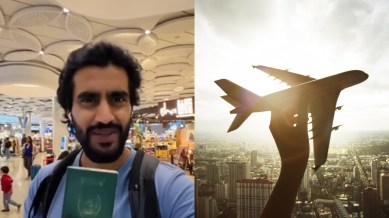📣 For more lifestyle news, click here to join our WhatsApp Channel and also follow us on Instagram
‘There was a slight risk’: Man transits through India on a Pakistani passport, says officials were ‘surprised’; here are the visa rules
Can Pakistani travellers step out of the airport during a layover in India? Here’s what an expert says

Waqas Hassan, a Pakistani passport holder, recently visited India. During a six-hour layover in Mumbai while travelling from Singapore to Saudi Arabia, the entrepreneur made the most of his time at the airport, trying the city’s famous vada pao and picking up souvenirs.
Sharing his experience on Instagram, he said, “I’ve been travelling for the past 15 years but nobody told me that Pakistanis can transit through India. So when I booked the flight there was a slight risk. When I gave the officials my passport, they were also surprised because not many Pakistani people do this, it was a new experience for them.”
monthly limit of free stories.
with an Express account.
Hassan’s post quickly went viral, with thousands of likes and views. He explained that Pakistani passport holders can only transit through India if they are on a connecting flight to a third country and are not allowed to exit the airport during the layover. “People with a Pakistani passport can fly to India only as long as it’s a connecting flight to a third country. Travellers with a Pakistani passport cannot exit the airport during the layover, i.e. self-check-in flights are not allowed for Pakistanis.”
So, can Pakistani passport holders transit through India? What do the rules say?
DK Ghatani, travel consultant and founder at Sikkim Expeditions, tells indianexpress.com, “Yes, Pakistani passport holders can technically transit through India — but only under very specific and tightly monitored circumstances. India’s visa policy for Pakistani nationals is one of the most stringent in the world, due to the complex and often tense relationship between the two countries. Unlike citizens of most other nations, Pakistanis cannot obtain visas online (e-visa) or on arrival. Every visa, including a transit visa, must be applied for well in advance through an Indian embassy or consulate.”
As per India’s Ministry of Home Affairs, he adds, a Transit Visa for Pakistani nationals is issued only if the person is either travelling from Pakistan to a third country via India, or returning to Pakistan from a third country, using India as a transit point. It allows a maximum stay of 72 hours in India and is granted for a single entry only. The visa must clearly mention the airport of entry and exit, and travellers are usually expected to stay in the city where they land.
“The key point here is that this transit isn’t automatic — it needs to be pre-approved, documented, and justified with clear travel plans,” Ghatani asserts.
Can Pakistani travellers step out of the airport during a layover if they have a valid transit visa, or are there additional restrictions?
In theory, Ghatani says that a Pakistani national with a valid transit visa can exit the airport and stay up to 72 hours in the city of entry, but there’s a catch. “Transit visas for Pakistani passport holders are city-specific, meaning if the visa states Mumbai, the traveller cannot go beyond its municipal boundaries — Hassan could enjoy street food or visit a café but not take a train to Pune.”
Additionally, some visas may require reporting to the nearest police station or Foreigners Registration Office (FRO) upon arrival, a restriction unique to Pakistani citizens, he states. “Airport-specific conditions also play a role, as some Indian airports, especially those not major international transit hubs, may not be accustomed to processing such visas, leading to delays or added scrutiny. In short, stepping out for a plate of Vada Pav might sound casual, but for a Pakistani traveller, it involves significant paperwork, planning, and permissions.”
📣 For more lifestyle news, click here to join our WhatsApp Channel and also follow us on Instagram